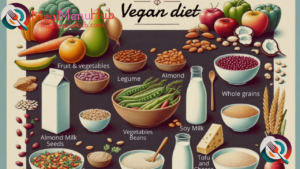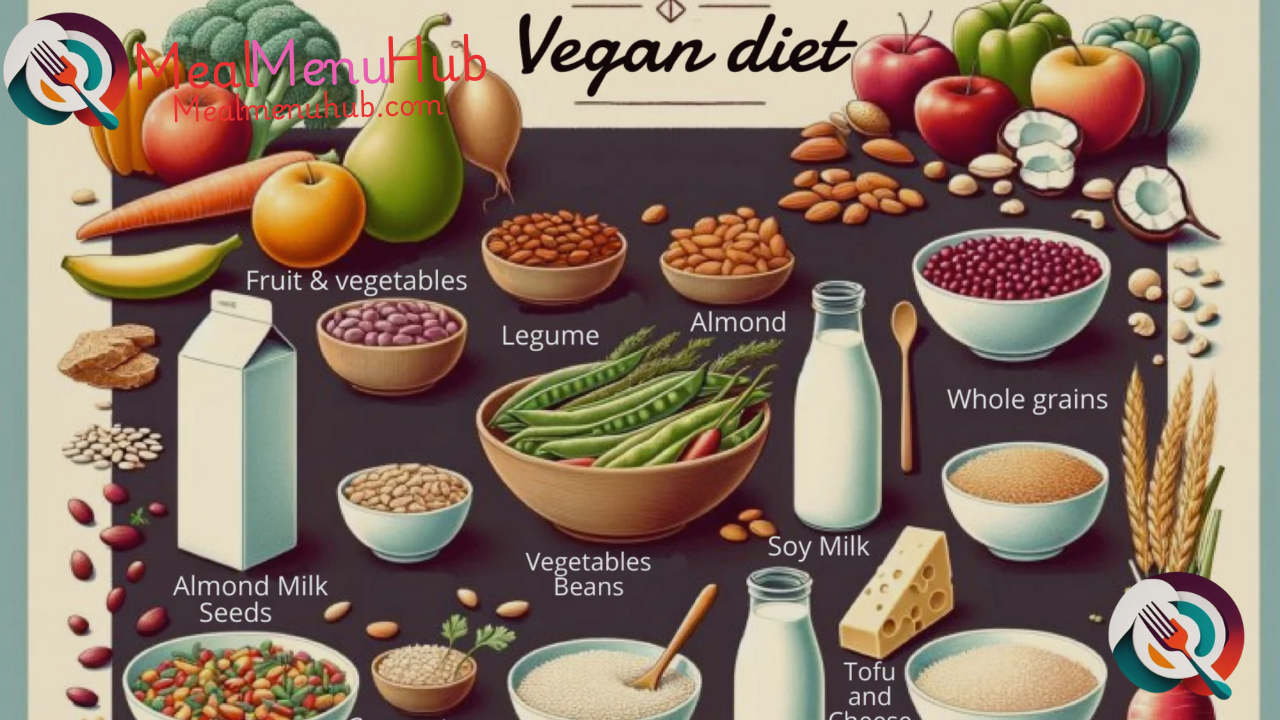The Ultimate Vegan Nutrition Guide: How to Thrive on a Plant-Based Diet
The Ultimate Vegan Nutrition Guide: How to Thrive on a Plant-Based Diet
Introduction
Veganism has become a popular lifestyle choice, embraced for health, environmental, and ethical reasons. Following a well-planned vegan diet can offer numerous health benefits, but it’s essential to know how to get all the nutrients your body needs. This guide will take you through everything you need to know about vegan nutrition, ensuring you thrive on a plant-based diet.The Ultimate Vegan Nutrition Guide: How to Thrive on a Plant-Based Diet

Understanding Vegan Nutrition Basics
Key Nutrients to Focus On
While a vegan diet can be nutrient-rich, it’s important to focus on certain key nutrients, including protein, vitamins B12 and D, iron, calcium, and omega-3 fatty acids.The Ultimate Vegan Nutrition Guide: How to Thrive on a Plant-Based Diet
The Importance of a Balanced Plant-Based Diet
A balanced vegan diet should include a variety of fruits, vegetables, grains, legumes, nuts, and seeds to provide a wide array of nutrients. Eating a colorful mix of foods daily ensures you’re getting a broad spectrum of vitamins and minerals.The Ultimate Vegan Nutrition Guide: How to Thrive on a Plant-Based Diet
Protein Sources in a Vegan Diet
Legumes, Beans, and Lentils
Beans and lentils are excellent protein sources, containing about 15 grams of protein per cup. They’re versatile and can be added to soups, salads, and main dishes.The Ultimate Vegan Nutrition Guide: How to Thrive on a Plant-Based Diet
Quinoa, Tofu, and Tempeh
Quinoa is a complete protein with all nine essential amino acids. Tofu and tempeh, made from soybeans, are protein-packed and can be used in a wide range of dishes, from stir-fries to sandwiches.The Ultimate Vegan Nutrition Guide: How to Thrive on a Plant-Based Diet
Nuts, Seeds, and Their Butters
Almonds, chia seeds, and sunflower seeds are great sources of protein and healthy fats. Nut butters like almond or peanut butter also add a protein boost to smoothies and snacks.The Ultimate Vegan Nutrition Guide: How to Thrive on a Plant-Based Diet
Essential Vitamins and Minerals
Vitamin B12: Importance and Sources
Vitamin B12 is crucial for nerve health and red blood cell formation. Since it’s not naturally present in plant foods, vegans should look for fortified foods or take a B12 supplement.
Iron: Absorption and Plant-Based Sources
Iron is found in beans, lentils, tofu, and leafy greens. Pairing these foods with vitamin C-rich sources like bell peppers or oranges can boost absorption.The Ultimate Vegan Nutrition Guide: How to Thrive on a Plant-Based Diet
Calcium for Bone Health
Plant-based calcium sources include fortified plant milks, tofu, and leafy greens like kale and broccoli. Calcium is essential for strong bones and teeth.The Ultimate Vegan Nutrition Guide: How to Thrive on a Plant-Based Diet
Getting Enough Healthy Fats
Omega-3s from Chia Seeds and Flaxseeds
Omega-3 fatty acids are important for heart and brain health. Chia seeds, flaxseeds, and walnuts are good plant-based sources.The Ultimate Vegan Nutrition Guide: How to Thrive on a Plant-Based Diet
Avocados and Nuts for Healthy Fat Intake
Avocados and nuts provide monounsaturated fats, which are great for heart health. Include them in your diet for an energy boost and better nutrient absorption.The Ultimate Vegan Nutrition Guide: How to Thrive on a Plant-Based Diet
The Role of Fiber in a Vegan Diet
Health Benefits of High Fiber Intake
Fiber is beneficial for digestive health, stabilizing blood sugar, and reducing the risk of chronic diseases. Most plant foods are naturally high in fiber, making it easy to meet daily requirements on a vegan diet.
Best Fiber-Rich Foods to Include
Fruits, vegetables, whole grains, and legumes are all high in fiber. Foods like apples, beans, oats, and leafy greens are excellent choices to incorporate regularly.
Meal Planning and Prep Tips for Vegans
Balancing Macronutrients in Meals
A balanced vegan meal should include a source of protein, healthy fats, and complex carbohydrates. Aim for a variety of colors and textures to keep meals interesting.
Creating a Weekly Meal Plan
Planning your meals helps ensure you’re getting a variety of nutrients. Start with breakfast and lunch ideas, then add dinners and snacks to complete your plan.
Quick and Easy Vegan Meal Prep Ideas
Batch-cooking grains, prepping veggies, and having a few sauces or dressings on hand can make weeknight meals quick and easy.
Avoiding Common Nutritional Deficiencies
Zinc and Magnesium
Seeds, nuts, and legumes are good sources of zinc and magnesium, essential for immune function and energy production.
Vitamin D for Immune and Bone Health
Consider a vitamin D supplement, especially during the winter months. Some mushrooms and fortified plant milks also contain vitamin D.
Iodine for Thyroid Function
Sea vegetables, such as nori and kelp, are great plant-based sources of iodine. Iodine is essential for thyroid health, especially on a vegan diet.
Vegan Supplements: Do You Need Them?
Recommended Supplements for Vegans
Supplements for B12, vitamin D, omega-3s, and possibly iodine are common for vegans. Always consult with a healthcare provider to determine what’s best for your needs.
How to Choose High-Quality Vegan Supplements
Look for certified vegan supplements from reputable brands. Quality is essential, as some supplements may contain animal-derived fillers or gelatin capsules.
Plant-Based Food Pyramid
Understanding the Vegan Food Groups
The vegan food pyramid includes grains, vegetables, fruits, proteins, and healthy fats. It’s a visual guide to ensure you’re eating a variety of foods.
Daily Servings and Portion Sizes
Each food group has recommended daily servings. For example, aim for several servings of vegetables and fruits, and about two servings of protein-rich foods per day.
Tips for Eating Out as a Vegan
How to Find Vegan-Friendly Restaurants
Many restaurants offer vegan options or can accommodate vegan diets. Apps like HappyCow help you find vegan-friendly places nearby.
Navigating Menus and Ordering Substitutions
Look for dishes with grains, veggies, and legumes, and ask for simple substitutions to make them vegan if needed.
Communicating Dietary Needs with Wait Staff
Politely inform your server of your vegan preferences. Most restaurants are accommodating and will suggest vegan-friendly options.
Vegan Snacks and On-the-Go Options
Easy Snacks to Keep You Energized
Fruit, mixed nuts, and hummus with veggies are quick, nutritious snacks to keep you fueled throughout the day.
Portable Protein Sources
Pack snacks like roasted chickpeas, trail mix, or protein bars for a protein boost when you’re on the go.
Healthy Vegan Bars and Store-Bought Options
Choose vegan protein bars that are low in sugar and high in protein for a convenient snack option.
Vegan Myths and Misconceptions
Addressing Protein Myths
Vegans can easily meet protein needs with a balanced diet. Protein is found in grains, beans, and many vegetables.
Understanding That Vegan Doesn’t Always Mean Healthy
Not all vegan foods are nutrient-dense. Focus on whole foods rather than highly processed options.
Debunking Common Concerns about Veganism
With proper planning, a vegan diet can provide all essential nutrients. Common concerns about deficiencies can be avoided with a balanced approach.
Environmental and Ethical Benefits of Veganism
Reduced Carbon Footprint
A vegan lifestyle can significantly reduce carbon emissions by decreasing demand for meat and dairy production.
Animal Welfare and Ethics
Veganism aligns with ethical choices regarding animal welfare, as it avoids products derived from animals.
Conservation of Natural Resources
A plant-based diet requires less water and land, conserving vital resources and supporting sustainability.
Conclusion
Transitioning to a vegan diet is both rewarding and impactful, benefiting personal health, the environment, and animal welfare. With a balanced approach and mindful choices, anyone can thrive on a plant-based diet and enjoy a rich variety of foods.
FAQs
- How much protein do vegans need daily?
About 0.8 grams of protein per kilogram of body weight, but needs may vary. - Is a vegan diet safe for children and pregnant women?
Yes, with proper planning and attention to nutrient needs. - Can you build muscle on a vegan diet?
Absolutely! Many plant-based athletes build muscle with a protein-rich vegan diet. - What are good sources of vegan iron?
Lentils, beans, tofu, quinoa, and dark leafy greens are excellent sources. - How can I ensure I’m getting enough calcium?
Include fortified plant milks, tofu, and leafy greens in your diet regularly - Terms and Conditions
